Tips for Consumers Hit By Surprise Medical Bills
By Consumers for Quality Care, on August 7, 2017

As surprise medical bills continue to be a concern for consumers, more people are taking notice. A recent Yale study highlighted the growing phenomenon.
Now, Huffington Post offers a first-person example of how to deal with the common issues that result in unexpectedly expensive hospital bills and discusses strategies for consumers to fight back. These suggestions include asking to receive an itemized copy of the bill, looking for coding mistakes, and keeping all records.
Requesting an itemized bill can help consumers understand what the hospital is charging for and discover if they are being charged for services or medications they did not receive.
“An itemized bill almost always contains errors, which is why I wasn’t about to pay a penny before carefully looking over my daughter’s charges.”
Errors, both accidental and purposeful, often stem from the hospital’s coding. Medical coding is used to determine what how much the hospital is reimbursed for. Errors in coding are common and they often result in consumers being on the hook for larger payments.
“The woman in the billing office told me that charge entry levels were codes used to determine the severity of cases entering the ER. They will dictate what reimbursements the hospital should receive, and they are entered in by the doctor. And as for mistakes in charge entry levels? They aren’t uncommon.”
Even small aspects of an ER visit can affect what code is entered for a bill.
“McSweeney also says this process can be tampered with. Providers can check boxes for procedures as simple as reviewing medical history or spending extra time with the patient. These things have the potential to kick up the charge entry coding level.”
I also did a bit of sleuthing and found that putting in a higher entry level, known as upcoding, can drastically hike up ER bills. While I didn’t realize it at the time, it’s illegal.
Beyond making hospital bills more expensive, upcoding can longer term consequences for consumers.
If you are upcoded in a way that indicates you have a medical problem that doesn’t exist, it could cost in a lot more than a big bill in the long run ― making you look like more of a liability to insurers.
Consumers battling surprise bill should be vigilant about keeping records of their dealings with the hospital, insurer and another other party.
Throughout the saga I kept a careful paper trail, noting each date I received a bill, whom I spoke with on the phone, what next steps had been suggested and taken. I reported the hospital to the Better Business Bureau, which was another waste of my time (medical providers have terrible ratings, but also don’t have competition).
These records are often vital in getting surprise bills’ mistakes corrected.
It was only at the point when I revealed I had recorded evidence and a paper trail that the hospital decided to write off the charges.



